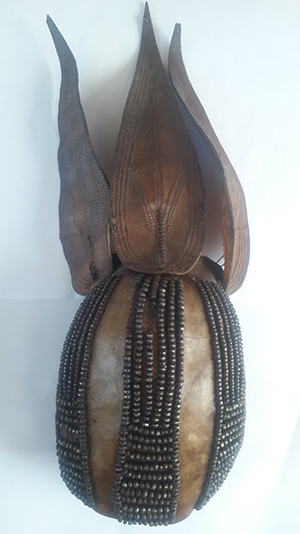Eveline de Klerk
WALVIS BAY – A Swiss woman, who was in possession of an artefact taken during the Ovaherero-Nama genocide, has returned the piece to Namibia.
The woman, who wants to stay anonymous, donated the headgear that was part of her family’s private collection to the Swakopmund Genocide Museum run by activist Laidlow Peringanda.
This headpiece is a three-pointed leather cap with a veil of animal skin rolled up, called ekori locally. Married women wore it on special occasions. German colonial settlers killed tens of thousands of indigenous Ovaherero and Nama people in 1904-08, a massacre labelled the first genocide of the 20th century by historians.
The artefact is one of the many which were taken from Namibia during that time by the Germans. The piece – after three months of planning and logistics – arrived earlier this week in Swakopmund, with Peringanda spending around N$8 000 to have it back home.
According to the Swiss woman, the piece has been in her family’s private art collection for years, and she felt compelled to return it to the rightful owners, rather than giving it to the government.
Peringanda told New Era this week the ekori was worn by Ovaherero women before colonialism as a hairpiece, a sacred cultural artefact.
According to him, the women, in the name of Christianity, were forced by the German missionaries to abandon their traditional attire by replacing them with long skirts (Victorian dresses).
“The Ekori was also replaced by a head scarf made from fabric called Otjikaiva. The two lateral points represent cattle horns,” he said.
Peringanda also indicated that he is in consultation with several other people who have Namibian artefacts in their possession.
“Most of the people are willing to return them, but are afraid of being held accountable for the atrocities committed by their forefathers,” he added. They also do not want to hand them over to government due to the long process, but want to directly hand it over to the families affected by the genocide.
He said hundreds of artefacts belonging to Africans are still being exhibited around the world. He, along with other activists, will be establishing an organisation to advocate for the return of such sacred items to their rightful owners.
The United Nations Declaration on the Rights of Indigenous Peoples – Articles 11 and 12 – specifies that indigenous peoples can demand the return of their artefacts as well as the right to restitution of cultural, intellectual, religious and spiritual property taken without their free and informed consent or in violation of their laws, traditions and customs, including the repatriation of human remains.


